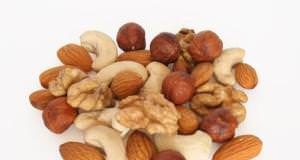Diabetes Drug Shows Promise In Reducing Risk of Cancer, Study Suggests
An inexpensive drug that treats Type-2 diabetes has been shown to prevent a number of natural and human-made chemicals from stimulating the growth of breast cancer cells, according to a newly published study by a Michigan State University researcher.
Eating Nuts Daily Could Help Control Type 2 Diabetes And Prevent...
Eating nuts every day could help control Type 2 diabetes and prevent its complications, according to new research from St. Michael's Hospital and the University of Toronto. In the research, published online by the journal Diabetes Care, a team of researchers led by Dr. David Jenkins
Benefits Of Nut Consumption For People With Abdominal Obesity, High Blood...
For the first time, scientists report a link between eating nuts and higher levels of serotonin in the bodies of patients with metabolic syndrome (MetS), who are at high risk for heart disease. Serotonin is a substance that helps transmit nerve signals and decreases feelings of hunger, makes people feel happier and improves heart health. It took only one ounce of mixed nuts (raw unpeeled walnuts, almonds and hazelnuts) a day to produce the good effects.
Possible Link Between Two Type 2 Diabetes Drugs And Pancreatic Cancer,...
Two newer drugs used to treat Type 2 diabetes could be linked to a significantly increased risk of developing pancreatitis and pancreatic cancer, and one could also be linked to an increased risk of thyroid cancer, according to a new UCLA study.
Metabolic Syndrome May Cause Kidney Disease
Metabolic syndrome comprises a group of medical disorders that increase people's risk of diabetes, heart disease, stroke, and premature death when they occur together. A patient is diagnosed with the syndrome when he or she exhibits three or more of the following characteristics: high blood pressure, high blood sugar, excess body fat in the waist/abdomen, low good cholesterol, and higher levels of fatty acids (the building blocks of fat).
Switch in Cell’s ‘Power Plant’ Declines With Age, Rejuvenated by Drug
Researchers at the Johns Hopkins University School of Medicine have found a protein normally involved in blood pressure regulation in a surprising place: tucked...
New Link Found Between Obesity And Insulin Resistance
Obesity is the main culprit in the worldwide avalanche of Type 2 diabetes. But how excess weight drives insulin resistance, the condition that may lead to the disease, is only partly understood. Scientists at Joslin Diabetes Center now have uncovered a new way in which obesity wreaks its havoc, by altering the production of proteins that affect how other proteins are spliced together.
Diabetes: A Link Between Oral And Overall Health?
Diabetes affects 18.2 million people in the United States and is expected to double by the year 2010. Additionally, diabetics who do not have good control over their blood sugar levels are more susceptible to oral health problems than non-diabetics, according to a study that appears in the November/December 2004 issue of General Dentistry, the Academy of General Dentistry's (AGD) clinical, peer-reviewed journal.
Periodontal Disease Independently Predicts New Onset Diabetes
Periodontal disease may be an independent predictor of incident Type 2 diabetes, according to a study by researchers at Columbia University Mailman School of Public Health. While diabetes has long been believed to be a risk factor for periodontal infections, this is the first study exploring whether the reverse might also be true, that is, if periodontal infections can contribute to the development of diabetes.
Dentists Can Identify People With Undiagnosed Diabetes
In a study, Identification of unrecognized diabetes and pre-diabetes in a dental setting, published in the July 2011 issue of the Journal of...
Diabetes Drug Side Effects Traced To Fat Action
For better or worse, a popular class of anti-diabetic drugs does more than lower blood sugar. One known as rosiglitazone (trade name Avandia) has been in the spotlight for its possible link to increased cardiovascular events, but it also seems to come with unexplained vascular benefits and an unwelcome tendency for weight gain.
Red Wine: Exercise In A Bottle?
As strange as it sounds, a new research study published in the FASEB Journal, suggests that the "healthy" ingredient in red wine, resveratrol, may prevent the negative effects that spaceflight and sedentary lifestyles have on people. The report describes experiments in rats that simulated the weightlessness of spaceflight, during which the group fed resveratrol did not develop insulin resistance or a loss of bone mineral density, as did those who were not fed resveratrol.














